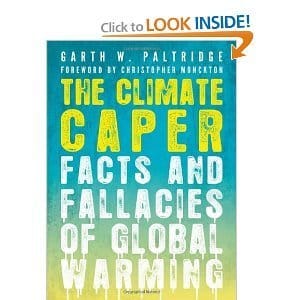The Climate Caper has been difficult to find here in Canada, perhaps because he is Australian. So I was delighted to hear about the $7.97 Kindle edition, which I purchased recently.
Paltridge is a retired physicist, with direct experience in climate-related matters. During the 1980s he was the chief research scientist in the atmospheric research division of Australia’s premier scientific organization – the Commonwealth Scientific and Industrial Research Organisation (CSIRO). Later, he spent 12 years in leadership roles associated with Antarctic research projects. His list of publications is eight pages long and exceeds 100 items.
Paltridge is, therefore, no intellectual lightweight. He is a senior scientist who has served in a number of senior capacities. This doesn’t mean he’s right about everything. But it does belie the claim that scientists who question the global warming orthodoxy are marginal personalities whose work never gets published in the peer-reviewed literature.
For me, the beginning and end of Paltridge’s book are especially interesting. This is where he examines what has happened to the culture of science. Scientists are human beings, after all. Which means they’re as susceptible as everyone else to runaway egos, peer pressure, group-think, and financial and institutional incentives.
Paltridge tells us about attending a meeting shortly after the release of the 2001 Intergovernmental Panel on Climate Change (IPCC) report. He says it seemed reasonable to point out that global temperature records may not be reliable – and that treating tree rings as the equivalent of thermometers is problematic.
In a depressing illustration of how IPCC partisans reject the sort of open debate that is the hallmark of genuine scientific inquiry, Paltridge describes the response:
It was like stirring a hornet’s nest. One after another the global warming experts rose to condemn me for questioning in public the conclusions of an IPCC report that had been compiled and endorsed as the consensus opinion of a large number of knowledgeable scientists. What right had I to make negative comments when I was not an expert in that particular aspect of climate science? If I wanted to question the science then the proper procedure was to write my thoughts in a formal scientific paper that could be subjected to peer review. And so on and so forth. Suffice it to say that the verbal spat was quite out of proportion to whatever was the crime that had been committed.The condemnation in fact continued for some days afterwards with a rash of fairly rude e-mails.demanding that I apologize for bringing disrepute to the IPCC process and to the scientific personnel associated with it.
This experience, he says, demonstrates “how difficult it can be these days for the ordinary scientist” to question the “official beliefs” the IPCC process was set up to produce.
Paltridge points out that politicians and other decision-makers now have “nowhere to turn for a second opinion.” The fact that major scientific institutions have become so dependent on the funds associated with global warming research has real-world consequences. As he observes:
Most of the developed countries have institutionalized their greenhouse activity within government agencies devoted specifically to mitigation of global warming. Their budgets are enormous. It is not likely that the public servants who staff them will be receptive to doubts about their reason for existence.
In other words, scientific institutions have adopted a point-of-view on climate change that serves these institutions’ interests. That is not the same as serving the interests of science itself. In fact, the hard-won, long-term reputation of science is now at risk because the very people who are supposed to be defending it are preoccupied by short-term matters like their budget.
Toward the end, Paltridge devotes some amount of time to helping us understand the social psychology of the climate science world. He paints a picture in which far too many people are graduating with research science credentials than can reasonably be employed. These people often find themselves working in unsatisfying situations, on work that is unlikely to even be read by many others.
And then along comes the IPCC. It offers them a chance to be a hero, to save the world from hellfire and brimstone. It sends them to meetings in exotic locales. It provides the media with a reason to interview them. It even links their name to a Nobel Peace Prize.
Let’s face it, most of us would find all of that intoxicating. How many people would realistically turn down such things when offered them on a silver platter? How many wouldn’t be tempted to swallow their misgivings, to tell themselves that all those other smart people must be right about climate change even if they themselves aren’t entirely convinced?
Paltridge argues persuasively that climate science is far too broad a subject matter for any person to be familiar with more than a small portion of the relevant research. So when we’re told that IPCC reports represent a scientific consensus he says this doesn’t mean what the public thinks – that the world’s most brilliant minds have each processed all the important data and have all come to the same conclusion.
“The consensus is really about the trustworthiness of other scientists” he says:
the individual specialist knows nothing (or nothing much) about most of it.to the extent that consensus exists at all, it is simply a public expression of faith in the profession. It is a public expression of the hope that there is somebody else within the system who is knowledgeable enough to pick up any major errors.
It is understandable that scientists are prepared to trust their own colleagues in this manner. But the public has a right to make up its own mind. And before doing so it has a right to be fully informed.
Paltridge’s book is an important contribution to the debate.
h/t C3 Headlines






